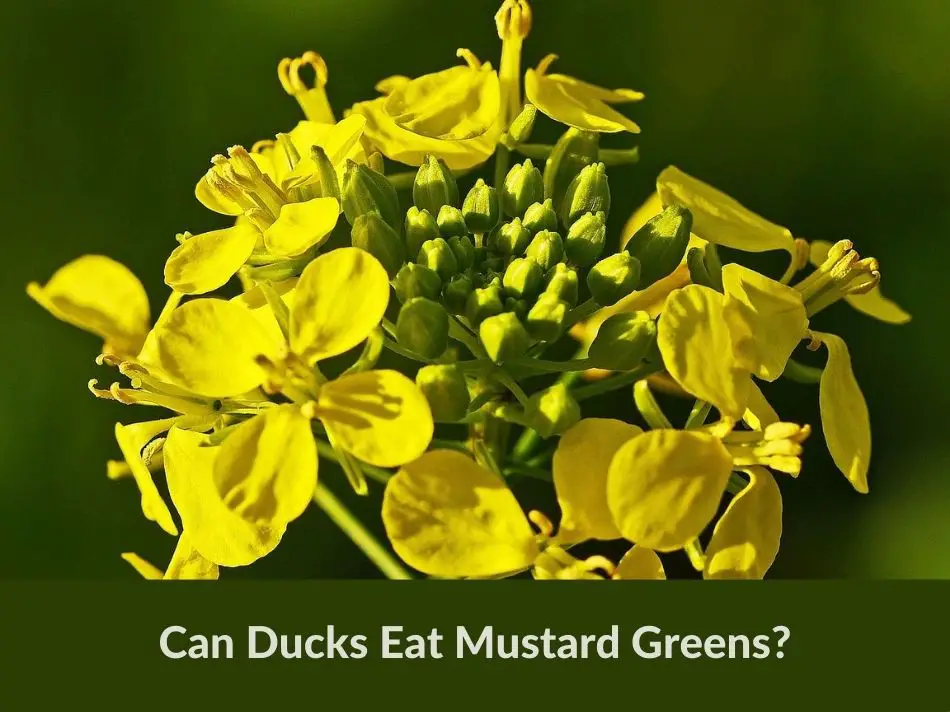In the wild, ducks typically forage for a variety of foods, including aquatic plants, small fish, insects, and various seeds. Their natural diet is rich in nutrients, diverse, and varies based on their habitat and the season. But, can ducks eat mustard greens?
Yes, ducks can eat mustard greens. It can be a delightful addition to a duck’s diet. These greens are not only safe but also packed with vital nutrients that can benefit our web-footed friends.
In this article, we’ll waddle through the nutritious world of mustard greens from a duck’s perspective. From understanding the basics of a duck’s diet to discerning the health benefits and feeding guidelines of mustard greens for our quacking companions.
How Often Can I Feed My Ducks Mustard Greens?
Mustard greens can be fed to ducks a couple of times a week as a treat or supplement to their regular feed. It’s important to ensure that these greens are fresh and have been thoroughly washed to remove any pesticides or chemicals.
Can Ducklings Eat Mustard Greens?
While adult ducks can safely enjoy mustard greens, it’s a tad different for ducklings. Ducklings need a protein-rich diet during their initial growth phase. Though mustard greens are nutritious, they shouldn’t be the main component of a duckling’s diet.
If you wish to introduce mustard greens to ducklings, ensure it’s given in tiny, chopped pieces and only occasionally.
Mustard Greens Nutritional Value
Below is the nutritional value of 100 grams of mustard greens.
- Calories: 27
- Protein: 2.86 g
- Fat: 0.42 g
- Carbohydrates: 5.7 g
- Dietary Fiber: 3.2 g
It also contains several vitamins and minerals as listed below.
- Vitamin A
- Vitamin B6 (pyridoxine)
- Vitamin C
- Vitamin E
- Vitamin K
- Copper
Are Mustard Greens Healthy for Ducks?
Yes, mustard greens are a treasure trove of vitamins and minerals. They contain vitamins like A, C, and K, and minerals such as calcium and iron, all of which contribute to a duck’s overall health.
- Vitamin A: Essential for ducks, Vitamin A supports good vision and keeps their skin and feathers healthy. It ensures that ducks can see clearly, especially in low-light conditions.
- Vitamin B6 (pyridoxine): This vitamin is crucial for metabolism and energy production in ducks. It aids in protein metabolism, helping ducks maintain their energy, particularly during strenuous activities like migration.
- Vitamin C: While ducks produce some amount of Vitamin C naturally, additional intake can bolster their immune system and aid in collagen formation, vital for their skin, feathers, and webbed feet.
- Vitamin E: An important antioxidant for ducks, Vitamin E protects their cells from damage. It’s essential for maintaining healthy skin, feathers, and robust immune function.
- Vitamin K: Critical for blood clotting, Vitamin K ensures that minor injuries heal quickly by aiding in rapid blood clot formation, which is vital for a duck’s overall well-being.
- Copper: Copper contributes to the pigmentation in duck feathers through melanin production, leading to vibrant plumage. Additionally, it supports healthy blood by aiding in iron absorption.
How To Feed Mustard Greens To Ducks
- Wash Them Thoroughly: Always wash the greens well to rid them of pesticides or chemicals.
- Chop Them Up: For easier consumption, chop the greens into smaller pieces, especially if feeding ducklings.
- Mix With Other Foods: You can mix mustard greens with other veggies or duck feed for a varied meal.
- Serve Fresh: Ensure that the greens are fresh and not wilted when feeding.
- Water is Essential: Whenever you feed ducks, always make sure they have access to clean water. This aids in digestion and ensures they remain hydrated.
More Vegetables Ducks Can Eat
Ducks certainly enjoy a varied diet, and many vegetables can be a delightful treat for them. Besides mustard greens, there’s an array of veggies that can be safely offered to these feathered friends.
Conclusion
Mustard greens are a nutritious and safe addition to a duck’s diet. Whether you’re a caretaker or a park visitor looking to treat our feathered friends, a bit of mustard green can be a welcome snack.
Disclaimer: The information in this article is for informational purposes only. I'm not an expert or a veterinarian.


